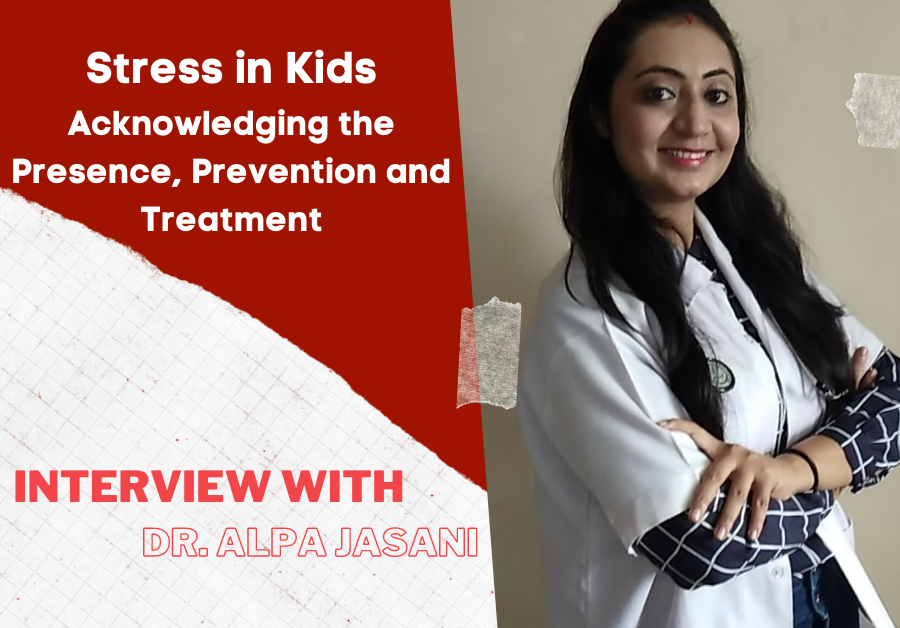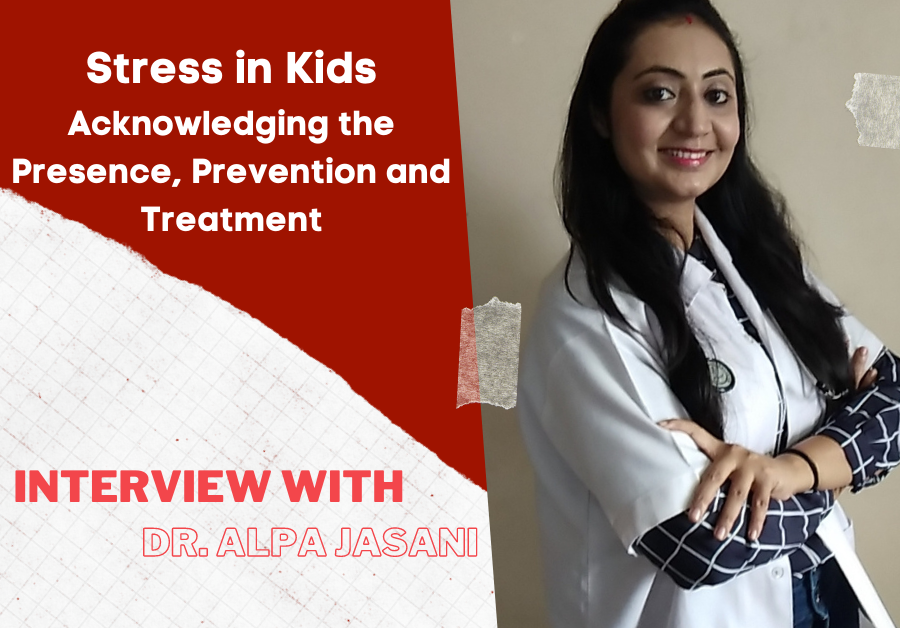Rucha’s daughter complained of mild pain in her chest during breakfast. Rucha brushed it off saying it would be better in some time. Knowing her daughter very well, Rucha thought that this might be an attention-seeking tactic. But to Rucha’s dismay, this became a usual thing. A concerned mother, she took this as a warning sign and googled for the reasons for chest pain in kids. The search results indicated acidity, gastric troubles, indigestion and the like. Not satisfied, she visited the pediatrician. Rucha was not prepared for what the doctor said. She did not believe it at first instance. Because the pediatrician had revealed that her daughter might be suffering from stress. STRESS? Stress cannot trouble a 5-year old, thought Rucha. This was difficult for Rucha to digest. How kids of this age can be stressed, opined Rucha!
Stress! I am stressed and so is my mother, my husband is stressed and so is his colleague. The principal is stressed and so are the teachers, that vegetable vendor standing at the corner of the street is stressed too. But the kids? Why should they stress about anything at all! How can a toddler, pre-schooler, or even a mid-schooler get stressed? They have all the privileges in the world. They do not have to earn, cook, work, or even take care of a family. They are served everything on the platter, isn’t it?
But have you ever thought that the platter that you just served to your child is quite big for his appetite?
Dr Alpa Jasani, an experienced pediatrician, reveals how stress is troubling the kids of the present age. About Alpa Jasani, she is an M.B.B.S. and has done her specialization in pediatrics. A powerhouse of knowledge, she is an expert in neonatology, lactation counseling, nutritional counseling, developmental check, and prenatal counseling. Dr. Jasani has been treating and healing children for a long time. She comes to know instantly whether the thing troubling the child is physical or mental. The freewheeling conversation broached on topics like how stress is not a modern menace, what should be the role of the parents in this scenario, and also why stress is not all that bad.

Question: What exactly is stress in kids?
In general, stress refers to any change that causes physical, emotional and psychological strain. However, in psychology, stress refers to a feeling of emotional strain and/or pressure. When parents come to know that their kids are stressed, their immediate question is what could possibly have gone wrong that their kids are stressed. Now, parents need to understand the causes of stress to help heal their child. And surprisingly, the reasons for stress in kids are quite common.
Changing friendship
Parents generally do not take the friendships of their kids seriously. For them, it is just a passing phenomenon. But kids are very attached to their friends. And when kids are separated from their friends, they are emotionally moved, which might lead to stress, eventually. There might be several reasons for changing friendships like transfer of the parents or even an argument between the kids.
Changing / growing baby
Kids do grow up and the changes in the body and mind are bound to happen. With age, kids lose their teeth, get glasses, experience a sudden spurt in height or even weight gain, etc. Children, at times, are not prepared for these changes and lack of communication and knowledge might stress them.
Competitive culture
This is one of the most common reasons of stress in kids. Children are stressed when they need to compete with others in formal education or while learning a skill. There is constant pressure on the kids to perform well. Children need to be on their toes in school because of peer pressure and sometimes pressure from the teacher. At home, they feel pressurized from their parents every so often, who do not want their kids to be left behind in the rat race. And amid all this, the child sometimes loses self-worth or the inclination to keep going which causes undue stress.
Bullying
Now, bullying leads to stress in kids and at times, stress causes kids to bully others. A child can feel bullied by anyone, be it other kids, teachers, caretakers or even parents. The kids feel intimidated by people of bigger height, more weight or with more clout. When they feel bullied, they inadvertently refuse to go to those places. The child starts making excuses to skip schools, play areas or visiting such places where the person who bullies is present. Kids often do not report bullying incidents. And the thrust from the parents or caregivers in such instances leads to stress in children.
Alone in groups
Friendships are very helpful to reduce stress in kids. But the phenomenon of group-ism in friends does exactly the opposite. Group-ism is one of the most common concerns of stress in children. Sometimes they are not in any of the groups and other times, in spite of being in a group, they feel alone in them. When the kids do not have a circle of friends that they can depend on in time of need, they feel stressed.
Independent yet dependent
As a child starts growing, she starts becoming independent. She begins taking many decisions on her own. And this makes her strong and confident. However, in many cases they are still dependent on their parents. And when they are not able to perform such tasks, they get stressed. For instance, it is easy for them to open a wrapper of the chocolate and munch it. Yet, they need permission of their parents to eat it. The dependency of permission from parents might stress them.
Question: What are the signs of stress in kids? What red alert parents should be aware of?
Stress is not a sudden development. It happens gradually. When a child faces similar incidents quite often, then it becomes stressful for her. And this results in stress, eventually. An incident which is not a natural behaviour of kids should alert parents. For instance, a kid who otherwise doesn’t pee in his sleep starts bedwetting suddenly might be stressed for some reason. Sudden changes in the behaviour of the child should be a red alert for the parents. Instead of scolding the child to behave properly, parents should go under the skin of such behaviour. Parents should look for emotional strains troubling the child:
Behavioural changes
If a child starts acting odd unexpectedly or throws tantrums, has sudden or extreme mood swings, undergoes changes in sleep patterns, begins bedwetting, faces nightmares, becomes clingy to parents often are signs of stress
Aches or Pain
When a child complains of frequent stomachaches, headaches, has trouble concentrating, suddenly starts getting poor grades, poor completion rate of projects or homework.
New habits
Young kids might also develop new habits like thumb sucking, nose picking, nail-biting, etc. Kids might also start lying to their parents or friends. Similarly, some kids might start stealing on a micro-level.
Question: Is stress a recent development, a byproduct of urban lifestyle or did it exist even earlier?
Stress has been present since time immemorial. However, the term was coined in the year 1936 by Hans Selye. Stress is not a recent development but it has become a lifestyle disorder due to changing settings. Without any doubt, stress has increased in recent years. This is because there has been a major shift in the way people have been living their lives. Earlier, there were huge families that worked and lived and stuck together, no matter what. This has given way to nuclear families. Earlier, a child had at least 2-3 siblings. However, now most of the families have a single child. Previously, in most of the families, only the male members earned a living. Conversely, both the parents work full time these days. The child, who had a huge support system in family members earlier, finds that she is alone in present set-ups. A kid does not have siblings or parents around her to talk her heart out. Parents are too tired at the end of the day for open communication with the child. On top of this, a child faces changing friendships. Some kids even have a water-tight routine from school to tuition to hobby/sports classes with no unstructured or free play. This has made stress a byproduct of urban lifestyle.
Question: Do kids feel stressed because of parental pressure?
Yes, they do. Parents are a part of the rat race. And while running this race, they carry their kids along with them to run just like they do. Children do not want to be a part of the race and the pressure to run causes stress in them. Further, parents are themselves very stressed and they pass on their stress to the kids. Staying with angry, demanding or stressed parents make the children undergo stress as well. Young kids also face Separation Anxiety which causes stress in them. The habit of parents to compare their kid to other kids in the school or the vicinity gives birth to stress. Sometimes, parents even compare the siblings to each other and this is another major cause of stress.
Question: Do parents accept their kids are stressed?
Some parents refuse to believe that their child might be stressed. They might attribute the behavioral changes to other factors. Thankfully, there are some parents who accept the presence of stress and resort to therapies and communication, which is the need of the hour. However, there are some set of parents who look for quick relief from stress and in the pursuit of quick results, they resort to self-medication, which is not a healthy development. It is advisable to meet a psychologist or a therapist for structured sessions to heal the child.
Question: Is there a correlation between stress and nutrition?
There is not a direct relationship between stress and nutrition. However, if a diet is poor and deficient in certain vitamins and minerals, then it can worsen the stress. While every child has his or her own level of tolerance to stress, a well-balanced diet helps in improving functions of the brain, shooting immunity and improving the circulation in the body. Balancing the levels of Vitamin B1, Vitamin B6 and minerals in the body benefits to some extent. This ultimately helps enhance the coping mechanism in situations of stress.
Question: What is Good Stress or Positive Stress?
Parents need to understand that stress is not all that bad. I think the word ‘stress’ is a victim of just bad marketing. So, many schools do not have the concept of competition in pre-primary to avoid stress in students. And the students do not experience the well-behaved cousin of bad stress – Good Stress. Yes, stress is good and positive when it is tolerable. Stress is good when it teaches the child to face challenges. Stress is good when it helps the child to compete fairly. And hence, there is no need to prevent stress completely in kids. Children should be reminded of their past successes to make them confident and take the challenge head-on.
When a child is learning cycling without stabilizers, she faces a little stress. She has the stress of falling off or tripping on the bump. But she needs to undergo this stress to take on the challenge and learn cycling. When her mother leaves the support, she is prepared to balance. She meets the challenge by pedalling constantly. She manages to cycle without her mother’s support. Herein she experienced good stress which helped her learn cycling without external support. When children are made to believe that they can do it, they experience good stress and are prepared to meet the challenge.
Question: How to prevent stress in kids?
After reading the post, some parents might become conscious of their upbringing. They possibly will always be worried whether their child is facing some kind of stress. Herein parents need to understand that children might face situational stress as well, which is a temporary phenomenon and parents should not get stressed about the same. A child just needs people who listen to him and are there in times of need. “Let’s be the village it takes to raise a child”
Counseling
When parents come to know that their children are facing stress, they should talk with the child. If it is because of friendships, they need to counsel the kid with an open mind. If the reason is separation anxiety, being there for the child for some time is the best thing parents can do. If the child is not ready to share the toys, parents need not force her to do the same. And relieve the child from the pressure of doing so. Building open channels of communication and winning her trust helps a lot in mitigating the stress that the child faces.
Stay away from comparison
Parents need not compare their kids with others. Skipping the competitive culture and letting the kids learn at their own pace without comparison helps the child bloom without any stress. It is completely fine that the child is not able to complete homework at the same speed as her classmate. Every child has a different pace of learning and parents need to build a support system where this pace of learning is nurtured rather than compared with others.
Education
When a child goes through growth spurts or gets a stutter or even glasses, parents need to communicate with the child about the developments in the body and how the child is still the same. In absence of open communication, kids start comparing themselves with their prior self or their peers and this comparison might lead to stress. In case of stress caused by bullying, parents need to educate the child about bullying as she might not be aware of the same. Instead of brushing off the incidents of bullying, parents should try to understand the mindset of the child and empower her against people who bully.
Environment
The environment in which a child is brought up is considered to be the third teacher; parents are the first and school-teachers are considered to be the second. Build age-appropriate surroundings for the kid. Take for instance, home. If the child is always told to be cautious at home with the fear that he might hurt himself, then the child is bound to get stressed.
Age-appropriate expectations
The expectations of the parents from their child should be age-appropriate. For instance, asking a 5-year old for a glass of water from the bottle. The child may or may not able to do so without spilling the water. When she is not able to, she might get stressed about getting a scolding or that she was not able to perform this simple task. This situation is also inversely true. At times, parents do not prepare their child with age-appropriate chores. And the child gets stressed when her peers are able to complete the chore but she is not able to do so. Hence, parents need to prepare the child based on age-appropriate chores and expect only the same. Yes, some kids are quick learners and they might be able to do more than they are expected to.
Culture appropriate behaviour
A child takes time to shift from one culture to the other. Here we are talking about different cultures, the culture of the family, the culture of the school, the city or even the community where the family resides. There is a major cultural shift when the child is transferred from one setting to the other. Parents need to prepare the child for the cultural shift beforehand. If a child is transferred from a western zone to the northern zone of the country, the language is changed, so is the weather, the food habits too are changed. When the child starts going to school in the present setting, he is bound to get a cultural shock and also discrimination from other students and even teachers at times. The parents should prepare the mindset of such a child and also talk to teachers beforehand to alleviate stressful situations. Further, there are some children who are handicap and receive special attention in the class, which might either be positive or negative. Parents of such children must counsel them ahead of time.
Question: How to manage the stress in kids?
When parents come to know that the little child is stressed, it sure is a shocker for them. However, conscious parenting can help the child overcome stress.
Also read: Sorted Parenting and its Benefits
Talk
Talk, talk and talk to the child. But do not let it be a one-way communication wherein you are just lecturing the child on how to overcome stress. And also, do not let it be a shower of questions to know about the feelings of the child. An open communication wherein one of the parents sits with the child and let her express her feelings or the instances wherein she was not able to cope helps a lot.
Name
This is the biggest cause of concern. Even the parents who are with the kids constantly are not able to name the expressions, facial gestures, emotions of their child. Comprehending the gestures of the child goes a long way in understanding them. It is necessary to understand the difference between naughty, thoughtful, funny, sad, emotional and other gestures of the child. Naming their emotions help in giving the right care and concern to them and preventing instances of stress.
Express
Children should be brought up in an environment wherein they are able to express freely, without the fear of being judged. Open channels of communication help children bloom like a flower.
Steps of relaxation
It is crucial to teach kids how to calm down in stressful situations. Children learn how to cope, from their parents. The way a parent reacts to stress, directly influences the child. When the children are not able to cope with stress, it results in anxiety. To prevent such instances, parents should breathe deeply and begin reverse counting. Children will follow suit when faced with stressful situations.
Final Words…
Phew! Surely, this is a long post on stress. Thank you Dr Alpa Jasani for her valuable outputs and suggestions. And yes, I did take a little stress to complete this post and my daughter took some stress too because her playmate was busy writing a post on stress. But this needed to be told or some flower would have withered away due to pressure, without the knowledge of the plant.


